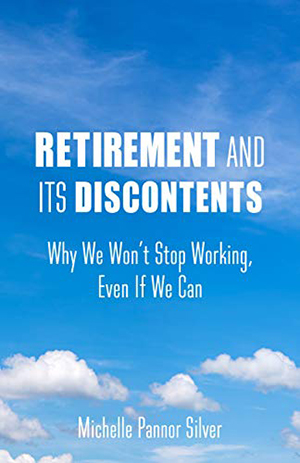 While many people actively want to retire, and many others can’t retire because of financial constraints, Michelle Pannor Silver’s book, Retirement And Its Discontents: Why We Won’t Stop Working, Even if We Can, is interested in a very specific group of people who disrupt our conventional understanding of what retirement means by choosing to continue to work.
While many people actively want to retire, and many others can’t retire because of financial constraints, Michelle Pannor Silver’s book, Retirement And Its Discontents: Why We Won’t Stop Working, Even if We Can, is interested in a very specific group of people who disrupt our conventional understanding of what retirement means by choosing to continue to work.
Average life expectancy has dramatically increased, creating a significant impact on the nature of work, and is at odds with the way that society traditionally understands levels of productivity as being bound to one’s age.
In an attempt to better understand why people in high performance careers saw retirement as a difficulty rather than a reprieve, Dr. Silver, an assistant professor at the University of Toronto Scarborough with joint appointments in the department of sociology and the Interdisciplinary Centre for Health and Society, interviewed doctors, CEOs, athletes, professors, and homemakers all in the midst of their transition into retirement.
University Affairs spoke to Dr. Silver about her new book and the greater implications it has within academia on both a personal and institutional level.
University Affairs: What drew you to write a book about this?
Dr. Silver: I got into gerontology and thinking about retirement because I was really influenced by my dad, who retired from social work when I was pretty young. He developed dementia, and it got to the point where we realized that he can’t see patients. He couldn’t really process what was happening. He wasn’t cognizant of it, and I internalized some of it, thinking “oh my God, this is a really big deal to end your career.”
I did my dissertation work in quantitative methods, looking at data points, spending years doing that. I was just dying to ask the data points some questions, and so I did some qualitative training and eventually got some grant funding and started this set of projects, which was to explore retirement, what it means at a personal level.
UA: How does academia inform perceptions about boundaries between work and life outside of work?
Dr. Silver: Academia is a great example of a line of work where those boundaries between work and life get blurred. There’s an expectation that you’re always thinking about work. Some of it is very deadline-oriented, like grant deadlines are very hard rules and if you miss it by a minute, you’re out, your application will not be looked at. But then there’s other aspects of it like writing and producing articles where the pressure is on you to accept those internal deadlines. To be really successful at it, you have to always be on, always be receptive to getting ideas anywhere.
On the other hand, academics are also a great example of people who can potentially be very successful in retirement. Many of the non-academic retirees I interviewed said “I don’t even know what to do, every day is a weekend.” They didn’t know how to structure their time. But academics do, they have to run a class and coordinate with TAs and all of that. Academics are quite well suited to retirement if they put the skills that they’ve been developing in their work to use for their own personal life.
UA: Could you describe what the term “working in place” means?
Dr. Silver: We have this notion in gerontology of “aging in place,” and that’s the idea that instead of going to a long-term care facility or a health institution as you age, many people are expressing preference to stay in their homes and age in place, in an environment that’s more personal. Either downsizing their home or staying in the same place they’ve always been in for the rest of their life.
The idea of working in place is similar in that it’s saying: let’s not push people out of the workplace because they’ve reached a certain chronological age. But instead let’s think about how we can help develop people’s later career skill set, network and contributions. So they don’t need to be pushed out, but instead pivot within or pivot horizontally and not just disregard them. Let’s focus on later career transitions, whatever way that might be, let’s make use of that experience if the individual is willing, able and interested.
A lot of time is spent doing early career development, and academic institutions would do well if there was more support and attention given to thinking about later career stages and transitions.
UA: What are your tips for a smoother transition into retirement?
Dr. Silver: If people could just channel a little of that energy that they’ve put into their research, or if they’re really devoted teachers, the energy they put into the classroom, into just thinking about what it is that they want for their next set of decades, really soul search. For some people, they get to a certain point where they realize their whole adulthood has been focused on work. To start thinking about hobbies or personal interests is just bizarre, because every trip they’ve ever taken has been for a conference. Practice asking yourself: what interests you outside your work?